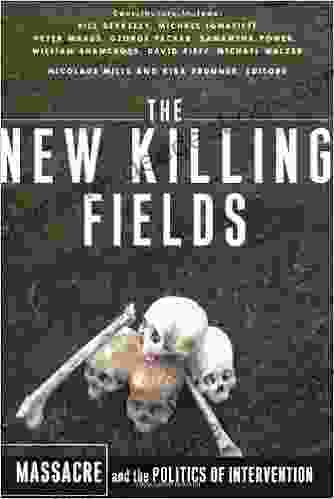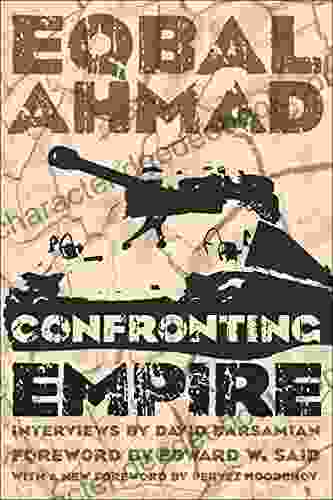Massacre And The Politics Of Intervention: A Deeper Look

Massacres are among the most heinous crimes against humanity, leaving behind a trail of unimaginable suffering and loss. The question of how the international community should respond to such atrocities has been a subject of intense debate and controversy. Some argue that intervention is necessary to prevent further bloodshed and protect human lives, while others contend that it often exacerbates the situation and leads to unintended consequences.
There is no easy answer to this dilemma. The decision to intervene is a complex one, fraught with ethical, political, and practical challenges. In this article, we will explore the different factors that shape the politics of intervention, examining the historical precedents, the ethical arguments, and the practical considerations involved in responding to massacres.
4.6 out of 5
| Language | : | English |
| File size | : | 3797 KB |
| Text-to-Speech | : | Enabled |
| Screen Reader | : | Supported |
| Word Wise | : | Enabled |
| Print length | : | 276 pages |
Historical Precedents
The history of intervention is a long and checkered one. From the Crusades to the Cold War, powerful states have often intervened in the affairs of weaker states, sometimes with noble intentions, but often for strategic or economic gain.
In the aftermath of the Holocaust, the international community adopted a new approach to intervention, based on the principle of "responsibility to protect" (R2P). R2P holds that states have a responsibility to protect their own populations from genocide, war crimes, ethnic cleansing, and crimes against humanity. If a state is unable or unwilling to do so, the international community has a responsibility to intervene to prevent these atrocities.
R2P has been invoked in a number of cases, including the interventions in Libya in 2011 and Syria in 2013. However, it remains a controversial principle, with some states arguing that it infringes on their sovereignty and that it can be used to justify unwarranted interventions.
Ethical Arguments
The decision to intervene in a massacre is a moral one. There are strong ethical arguments both for and against intervention.
Those who support intervention argue that it is a moral imperative to prevent further bloodshed and protect human lives. They argue that the suffering of the victims and the responsibility to protect outweigh any concerns about sovereignty or unintended consequences.
Those who oppose intervention argue that it often exacerbates the situation and leads to unintended consequences. They argue that intervention can lead to prolonged conflict, civilian casualties, and the destabilization of the region. They also argue that it can undermine the sovereignty of the state and create a precedent for future interventions.
Practical Considerations
In addition to the ethical arguments, there are also a number of practical considerations that shape the politics of intervention.
One of the most important considerations is the availability of resources. Intervention is a costly and complex undertaking, and it is not always possible to commit the necessary resources to intervene effectively.
Another important consideration is the political will to intervene. Even if the resources are available, there is no guarantee that the international community will have the political will to intervene. Intervention is often unpopular, and it can damage relations with the target state and its allies.
Finally, there is the question of unintended consequences. Intervention can have a number of unintended consequences, including prolonged conflict, civilian casualties, and the destabilization of the region. It is important to weigh these potential risks against the potential benefits of intervention.
The decision to intervene in a massacre is a complex one, fraught with ethical, political, and practical challenges. There is no easy answer, and each case must be considered on its own merits.
However, it is important to remember that the suffering of the victims and the responsibility to protect outweigh any concerns about sovereignty or unintended consequences. When faced with a massacre, the international community has a moral imperative to act to prevent further bloodshed and protect human lives.
4.6 out of 5
| Language | : | English |
| File size | : | 3797 KB |
| Text-to-Speech | : | Enabled |
| Screen Reader | : | Supported |
| Word Wise | : | Enabled |
| Print length | : | 276 pages |
Do you want to contribute by writing guest posts on this blog?
Please contact us and send us a resume of previous articles that you have written.
 Book
Book Chapter
Chapter Text
Text Genre
Genre Library
Library Paperback
Paperback E-book
E-book Magazine
Magazine Newspaper
Newspaper Paragraph
Paragraph Bookmark
Bookmark Shelf
Shelf Glossary
Glossary Bibliography
Bibliography Preface
Preface Synopsis
Synopsis Footnote
Footnote Manuscript
Manuscript Codex
Codex Bestseller
Bestseller Classics
Classics Library card
Library card Narrative
Narrative Autobiography
Autobiography Memoir
Memoir Thesaurus
Thesaurus Character
Character Periodicals
Periodicals Lending
Lending Reserve
Reserve Academic
Academic Reading Room
Reading Room Special Collections
Special Collections Interlibrary
Interlibrary Literacy
Literacy Study Group
Study Group Storytelling
Storytelling Reading List
Reading List Book Club
Book Club Textbooks
Textbooks Nicole Seitz
Nicole Seitz David Lewman
David Lewman Amy Gahran
Amy Gahran Logan Lo
Logan Lo Elaine S Povich
Elaine S Povich Min Zhou
Min Zhou Lani Hankins
Lani Hankins Jan Zielonka
Jan Zielonka Bonita M Kolb
Bonita M Kolb Eugene Mccann
Eugene Mccann Elizabeth Winthrop
Elizabeth Winthrop Denise M Canela
Denise M Canela Troy Blappert
Troy Blappert Norbert Niemann
Norbert Niemann Litmux Books
Litmux Books Meenakshi Veeraragavaprabu
Meenakshi Veeraragavaprabu Carmine Sangiovanni
Carmine Sangiovanni Rafe Blaufarb
Rafe Blaufarb James H Lubowitz Md
James H Lubowitz Md Nathan Sykes
Nathan Sykes
Light bulbAdvertise smarter! Our strategic ad space ensures maximum exposure. Reserve your spot today!

 Isaac MitchellAntony and Cleopatra: No Fear Shakespeare Volume 19: A Guide to Understanding...
Isaac MitchellAntony and Cleopatra: No Fear Shakespeare Volume 19: A Guide to Understanding... Ismael HayesFollow ·6.6k
Ismael HayesFollow ·6.6k DeShawn PowellFollow ·4.9k
DeShawn PowellFollow ·4.9k Forrest BlairFollow ·5k
Forrest BlairFollow ·5k Octavio PazFollow ·13k
Octavio PazFollow ·13k Elias MitchellFollow ·9.1k
Elias MitchellFollow ·9.1k Jay SimmonsFollow ·19.6k
Jay SimmonsFollow ·19.6k Robert HeinleinFollow ·17.7k
Robert HeinleinFollow ·17.7k Jesse BellFollow ·2.6k
Jesse BellFollow ·2.6k
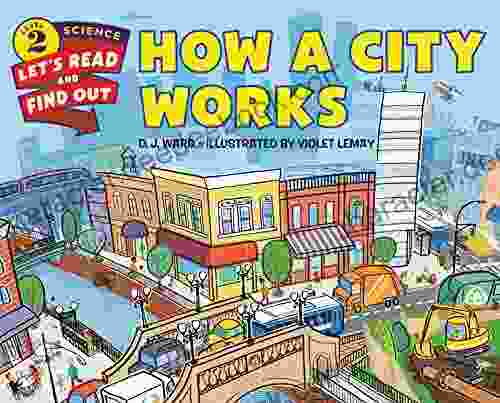
 Ronald Simmons
Ronald SimmonsHow Do Cities Work? Let's Read and Find Out!
Cities are...
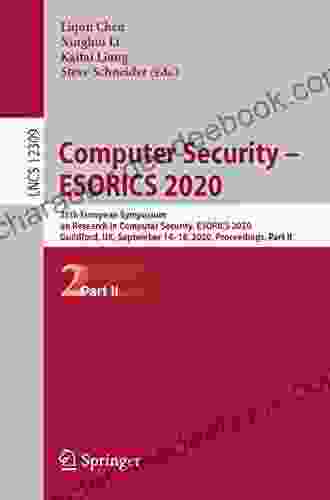
 Tom Clancy
Tom Clancy25th European Symposium on Research in Computer Security...
<p>Guildford,...

 Lawrence Bell
Lawrence BellHow We Decide: Cognitive Behavior in Organizations and...
Organizations are...

 E.M. Forster
E.M. ForsterOver 60 Little Masterpieces To Stitch And Wear:...
Embark on a Creative...
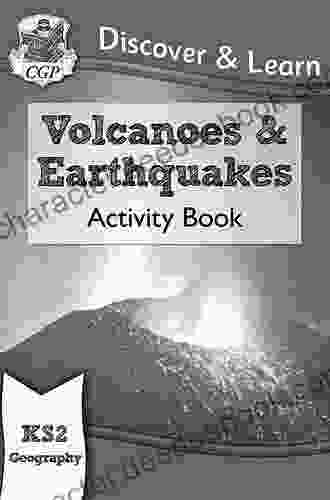
 Douglas Foster
Douglas FosterUnveiling the Educational Treasure: CGP KS2 Geography:...
In the ever-evolving educational...
4.6 out of 5
| Language | : | English |
| File size | : | 3797 KB |
| Text-to-Speech | : | Enabled |
| Screen Reader | : | Supported |
| Word Wise | : | Enabled |
| Print length | : | 276 pages |


